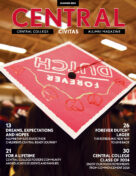 “I train and coach foreign-born business professionals and vocational employees to communicate more effectively in their workplace,” – that’s how Jennifer Voss describes her job in a nutshell. But the work requires an open mind that’s able to look past cultural barriers and misconceptions and assist people in communicating, no matter their differences.
“I train and coach foreign-born business professionals and vocational employees to communicate more effectively in their workplace,” – that’s how Jennifer Voss describes her job in a nutshell. But the work requires an open mind that’s able to look past cultural barriers and misconceptions and assist people in communicating, no matter their differences.
Creativity is important for this work because it allows for new ways of looking at problems. Voss says in general, humans are “quick to make assumptions.” Helping people to succeed at work in a culture that isn’t their own involves flexibility and a willingness to try out new ideas.
“In the work I do I’m always trying to find new ways to help my trainees overcome language and cultural barriers,” she says. “How can we be better communicators? What are the best strategies to learn a language?”
The employees she works with may speak English fluently and have graduated from a top university, but they still often have difficulties when entering the workforce in the U.S. “Not only is there a language interference, there’s also a cultural interference. I put together a communication training plan to help them succeed,” she says.
Voss first decided she wanted to work in an international capacity while on a summer trip to Australia during high school. A native of the San Francisco Bay Area, she learned about Central through her mother’s family, which lives in Mason City. While earning her degrees in German and international management, Voss studied abroad in Germany and Austria. She says her Central experiences helped to instill a global perspective, which allowed for a quick transition to working internationally after college.
“Having an internship in Austria opened my eyes to what it’s like to work in a different environment,” she says. “My international management degree equipped me with the necessary skills to successfully work in a global economy: we were required to do an internship overseas and minor or major in a second language. Additionally, all classes in our program had a global component, so we were constantly working with different case studies and completing projects which helped us to build cultural awareness, leverage ambiguous situations and adopt a global mindset.”
How is creativity important for intercultural work?
Creativity is very important in my work. Neuroscience studies have shown that our brains are wired differently with respect to our cultural values and cultural environment. Therefore, as I work with trainees with different cultural values from my own, I need to be cognizant of how they learn (i.e., how they process information; how they prefer to receive feedback; and, what a conducive learning environment looks like for them).
How does your liberal arts background give you an edge?
My different classes in humanities, arts and sciences have allowed me to have a broader and deeper understanding of the world around me. Going to a liberal arts college has given me an edge because, as we become more globally connected, I am able to not only develop business relationships more easily and quickly, but also able to glean new insights and generate ideas.












To encourage serious, intellectual discourse on Civitas, please include your first and last name when commenting. Anonymous comments will be removed.
Comments are closed.